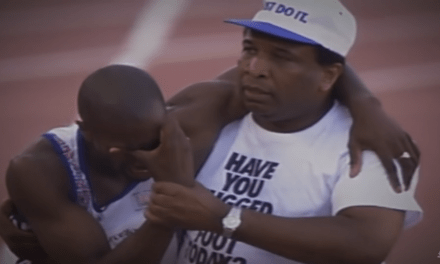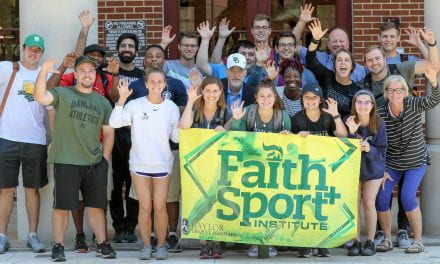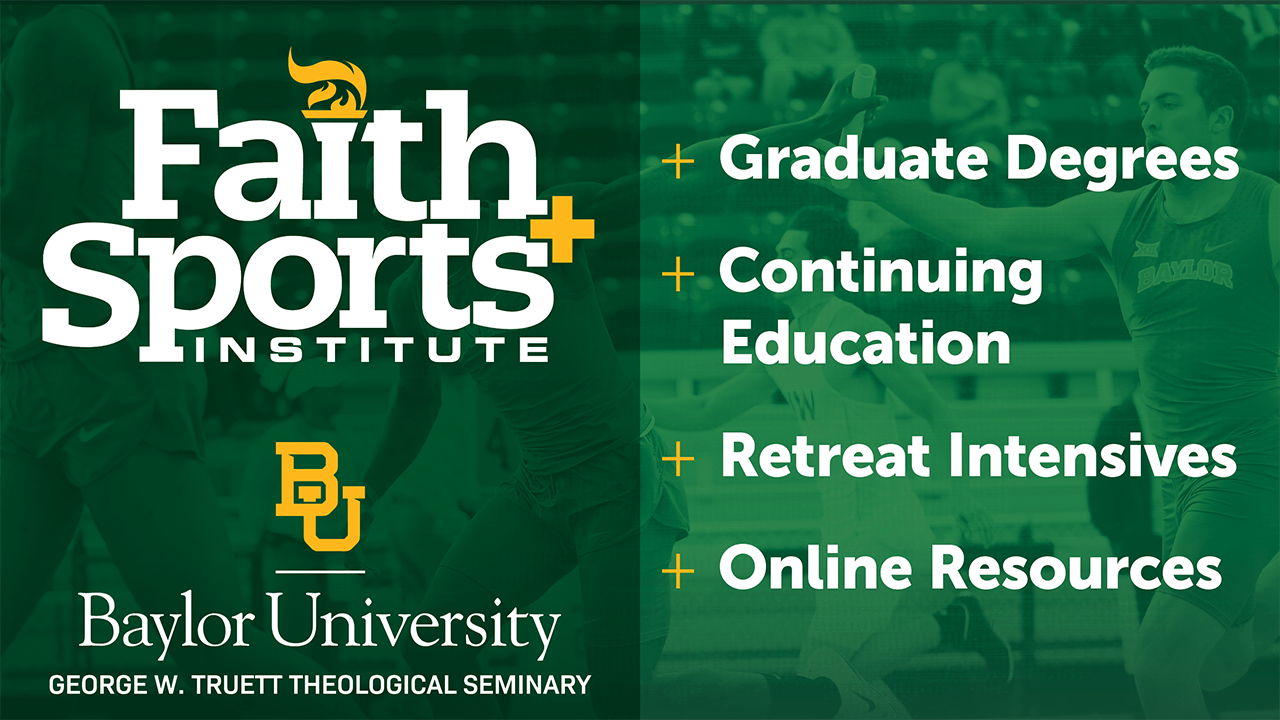
Case Smith
The bench. Most athletes have been there at some point, but it’s never a place they want to stay. Athletes long to step into the action, to get in the game and play.
The pew. Most Christians have been there at some point, too. But there’s usually less of a desire to get in the action. Pastors can eloquently deliver a sermon, the Sunday school teacher can effectively instruct their class, and the worship leader can sing a powerful song about God’s love. While the head and the heart receive information and inspiration, it rarely seems to move people out of the pews. Am I the only one noticing the raised hands on Sunday but the seemingly slow feet Monday through Saturday?
Of course, there are important differences between the bench and the pew. The bench can imply punishment; it is the place an athlete might go because of lesser talent or poor performance. The pew, however, is for everyone, regardless of talent or performance. It represents a place where Christians gather every Sunday in a posture of worship, reminded of God’s work on our behalf.
But the ritual of gathered worship in the pews can sometimes cause us to miss out on the other part of our Sunday services: they are also intended to send us out into the world, empowered and equipped to witness to Christ and His Kingdom. Like an athlete on the bench staying ready and attentive, patiently waiting for their opportunity to play, those in the pews should be expectant and ready to live out their faith when they step outside the church walls. Unfortunately, in our churches there is a common disconnect between the information preached and received on a Sunday morning and the actual living out of our faith. The exhortation of James to be “doers of the word, and not hearers only” (1:22) hits too close to home for many of us.
While I certainly do not have it all figured out, one thing that has helped me process this tension is my involvement with the Faith & Sports Institute’s (FSI) High School Retreat. The purpose of the retreat, which builds on and extends ideas that the FSI directors helped to develop during their tenure with Athletes in Action, is to equip Christian student-athletes with theological truths and training that help them to integrate their faith with their sport. It’s an incredible week where young athletes are immersed in an environment that challenges them spiritually, physically, and emotionally. The end-goal, however, is not the typical “spiritual high,” but instead lasting transformation.
For the past two years, I have served as the Senior Mentor for FSI. I get to shepherd our eclectic group of young adult mentors who work with the high school student athletes that attend our retreat. From my firsthand participation with FSI, I believe it has something the local church can apply to its own discipleship and ministry.
Embodied Faith
Simply put, the philosophical pedagogy, or teaching strategy, of FSI is “information-formation-transformation.” We often say it in our meetings: “hear-see-do.” The idea is to not only hand out information, but to also provide opportunities and experiences that allow the information to form deeply in the person’s life, bringing about transformation.
Comparatively, in the local church we tend to emphasize the proclamation of information. We believe, as Romans 12:2 says, that Christians will be “transformed by the renewing of your mind.” This often means listening to the preaching and teaching of Scripture. Yet, one only needs to read one verse prior in Romans to see that Paul calls for the church to be transformed not only by information but also by “offer[ing] your bodies as a living sacrifice.” Transformation is the outcome of embodied faith.
In the context of sports, the transformation of an athlete from sitting on the bench to playing in the field doesn’t happen through the coach offering more information. Instead, it develops as the athlete sees it modeled by coaches and teammates, and then practices it themselves. Eventually, the true test for an athlete comes on game day when they take what they have learned and practiced and apply it in competition. Likewise, the true test of transformation in our churches is not on Sunday, but how our people embody their faith Monday through Saturday.
Do we not see this in the life and ministry of Jesus as well? How often do we see Jesus teach his disciples and then provide formative experiences and practices? The disciples were not transformed solely by hearing Jesus, but by following, watching, and practicing his ways. It’s one thing to hear, “a servant is not greater than his master,” but what happens when the master gets on his hands and knees to wash the servant’s feet?
The transformation we long to see, from a passive faith in a pew to a living and active faith in the streets, happens when we don’t simply offer more information, but when we begin to provide practices and experiences that form (and ultimately transform) our churches.
At the FSI Retreat, we have the advantage of working with high school athletes who understand this concept of embodied learning better than most. An athlete knows that information alone won’t get them on the field, but that they need to practice and apply what they learn. Unfortunately, however, there is a disconnect with their faith. Like many other Christians, the young athletes often see faith as something that happens while they sit in the church pews. They struggle to truly embody their faith on the field (and in the world).
One of the best moments at the retreat is when the lightbulbs go on, and a student-athlete realizes how faith can genuinely integrate with their sport—how God is present even in the middle of competition, and how Christian faith matters on the field as much as in the pew.
Laboratory of Christian Virtue
This realization is part of a process centered on redefining and then pursuing greatness. Counter to the world, which defines greatness with achievements and accolades, at FSI we believe God has the ultimate authority on greatness—and that we are made for greatness. Dallas Willard, the late philosopher and Christian author, put it this way: “The most important thing in your life is not what you do; its who you become. That’s what will take you into eternity.”
Thus, we ask the students to examine who they are becoming by focusing on five virtues grounded in theological truth: faith, love, discipline, hope, and courage. And then we ask them to actually practice and cultivate these virtues while they are competing. One of the more enlightening ideas for me came when I heard an FSI leader describe sports as a laboratory for our faith. Of course, people often understand sports as a kind of test of our abilities, mental strength, and character. However, sports settings can also be a lab where we take what we learn about ourselves and God and put it to the test, experimenting with different practices that can be implemented in our everyday lives, whether in sports or out.
For the virtue of faith, one of the practices we ask the student-athletes to experiment with is “Sanctify this Place.” It’s a simple practice—in fact, many athletes and teams do this without fully acknowledging what they are doing. But we try to cultivate a reflective intentionally. Before competition, we ask the students to pray and recognize God’s presence with them. Furthermore, we challenge them to glorify God while competing on the field instead of making the field a space for their own glory. We conclude the lab by having each student pause and reflect on the experience, asking questions like: Did I ever consider God’s presence once the game began? Did the prayer beforehand affect my attitude and effort?
After providing space for student-athletes to practice five Christian virtues in the context of sports, our last and most formative experience—the Great Race—helps them bring it all together, putting athletes through a challenging and physically demanding experience in which they once again get off the bench and practice what they have learned in real time. Similar to the labs, the Great Race is a combination of physical activity and reflection, with several obstacles and events that correspond to the stations of the cross. In this way, students are encouraged to apply what they learned through the retreat as they consider how Jesus himself embodied faith in the midst of opposition and suffering.
Ultimately, our goal is transformation, and we accomplish this by offering formative experiences that build off the information by providing space for active implementation and reflection. More often than not, we don’t hear from a former FSI student-athlete about how our teaching has impacted them, but how the labs and tools we equipped them with have changed their sports experience.
Bringing it to the Church
What would it look like for the church to consider this type of ministry and discipleship within its weekly rhythms? To be sure, the local church already has essential formative embodied practices, like participating in the Lord’s Supper. But I would argue the local church should encourage more formative experiences and practices, not less. And we need to consider how faith should shape daily lives and experiences of our members throughout the rest of the week.
My suggestion is to begin by looking at Jesus, whose life and ministry consisted of washing his disciples’ feet, eating meals with tax collectors and sinners, and caring for those who were sick and poor. Our King Jesus did not hide away in a holy place, but left his throne of glory to serve and give his life as a sacrifice. He is establishing His Kingdom and commissions us to be a part of it. In response, we must courageously take up the call of embodied faith—a faith that does not stay in the pew after church on Sundays, but that loves God and neighbor daily.
This might look like something that happened at my church last year. After learning that many of our food-pantry parents were concerned with the pandemic’s effects on their children’s educational development, we called upon retired teachers in our congregation to step forward and provide mentoring over a few weeks. It was a deeply formative experience for our volunteers and students as each courageously crossed socio-economic barriers.
The important thing is not to overthink it. Getting out of the pew can happen in big ways and small ways—not just organized ministry events, but also ordinary and routine moments throughout your week. At FSI, we practice embodied faith in the context of sports. What context are you in? What everyday contexts are your people in?
Ultimately, this is where the fun begins as you prayerfully consider how you can take what you and your people are learning and participate together in formative experiences that lead to lasting transformation.
 About the author: Case Smith was born in Starkville, MS, but raised in Waco, TX, where he currently lives while serving First Woodway Baptist Church as the Associate Minister of Community Outreach. He played baseball for a couple years at Baylor University, graduating with a BA in Religion in 2017. He is now pursuing his MACM degree at Baylor’s Truett Seminary and is also involved with the Faith and Sports Institute, serving as the Senior Mentor for the FSI Retreat. Sports (and faith) run in the family: his dad is a college baseball coach, mom was a college cheerleader, brother works in college football, and his wife of four years is a PE Teacher. He and his wife just welcomed their first child, Raleigh Marie Smith, in February 2021.
About the author: Case Smith was born in Starkville, MS, but raised in Waco, TX, where he currently lives while serving First Woodway Baptist Church as the Associate Minister of Community Outreach. He played baseball for a couple years at Baylor University, graduating with a BA in Religion in 2017. He is now pursuing his MACM degree at Baylor’s Truett Seminary and is also involved with the Faith and Sports Institute, serving as the Senior Mentor for the FSI Retreat. Sports (and faith) run in the family: his dad is a college baseball coach, mom was a college cheerleader, brother works in college football, and his wife of four years is a PE Teacher. He and his wife just welcomed their first child, Raleigh Marie Smith, in February 2021.





